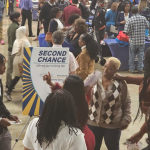
(By iQoncept_Shutterstock)
By Anne Mosley and Majorie Sims
Many of Maryland’s families are still reeling from the events of the last year. The pandemic and its economic impact underscored how families with low incomes face systemic barriers and structural inequities that prevent them from unlocking their full potential to support their families and contribute to their communities. The American Rescue Plan (ARP) provides for unprecedented resources to improve the lives of families. As Governor Larry Hogan deploys these funds, he can take immediate action to support children and the adults in their lives simultaneously, intentionally, and effectively.
Ascend at the Aspen Institute focuses on improving outcomes for the whole family, children and their parents, by applying a two-generation (2Gen) approach and a gender and equity lens. Two-generation approaches build family well-being by intentionally and simultaneously working with children and the adults in their lives together. The 2Gen approach defines well-being holistically, just as parents themselves do.
A 2Gen approach involves working with families in five key areas: physical health and mental health; early development, learning, and care; postsecondary and employment pathways; economic assets; and social capital. The ARP funds offer the opportunity to use proven 2Gen strategies to recover from the COVID-19 pandemic while at the same time expanding long-term opportunities for all of Maryland’s families.
State of the Field: Two-Generation Approaches to Family Well-Being, offers guidance to policymakers who want to translate the 2Gen mindset and guiding principles into forward-thinking actionable policies that advance family well-being. Here are five recommendations from that report outlining how states can use ARP funds to advance families’ potential and support community resilience:
Create Family Policy Councils to advise state agency plans for ARP funds. Two-generation approaches center on families and their strengths. Family Councils and Advisory roles, which have been piloted and refined by Ascend and leading state human services agencies, are a powerful governance innovation that give policymakers a proven way to authentically engage the perspectives, expertise, and insights of parents, guardians, and caregivers. The results are smarter policies and more robust public support. Building upon the lessons and practices of Head Start Parent Policy Councils, councils would recruit and compensate parents to address, inform, and develop recommendations on state inter-agency collaborations focused on improving outcomes for families with low incomes.
Create a 2Gen innovation and implementation acceleration program to fuel and scale the momentum of interest in the 2Gen approach as a mechanism to serve families effectively, holistically, and equitably. 2Gen Innovation funds would prioritize families with low-incomes and those in underserved communities and be made available through an application process requiring clear target goals, equity plans, and performance measures.The resulting insights and innovations can inform foundational elements of Maryland’s efforts to rebuild effective systems that advance economic mobility.
Invest in community-wide partnerships and adapt existing postsecondary programs to provide support for students with caregiving responsibilities. As higher education grapples with declining enrollment numbers, investing in postsecondary pathways for student parents presents both a growth opportunity and chance to create more – inclusive and – equitable postsecondary experiences leading to degree and credential attainment.
Develop a family well-being and equity framework. Align ARP funding with other federal funding, technical assistance, peer learning, and evidence to achieve the outcomes families want and deserve. Here, Maryland is leading the way. Governor Hogan has been a pioneer establishing the Two-Generation Family Economic Security Commission to identity the state services and policies that can be used to mitigate multigenerational poverty. The Commission is now permanently established in the Maryland Department of Human Services.
Scale community-based innovations. Look to models that we know work, like those we’ve seen supporting fathers and their children in Baltimore, Md. at Center for Urban Families, led by Ascend Fellow Joe Jones.
Let’s pursue new opportunities based on what is actually working, opportunities that can open up a better way of serving parents and children together. Bold, pragmatic, equitable, and proven 2Gen strategies, together with the expertise and experience of Maryland’s Ascend Network Partners, can open up new possibilities for families. As a mom from Maryland told us about navigating the pandemic, “If we make it out of this, we will be unstoppable.” As Maryland rebuilds, let’s make sure parents and families will have the tools and conditions they need and deserve to be unstoppable.
Anne Mosle is the vice president of the Aspen Institute and the executive director of Ascend at the Aspen Institute.
Marjorie Sims is the managing director of Ascend at the Aspen Institute.
The opinions on this page are those of the writers and not necessarily those of the AFRO. Send letters to The Afro-American • 145 W. Ostend Street Ste 600, Office #536, Baltimore, MD 21230 or fax to 1-877-570-9297 or e-mail to editor@afro.com
Help us Continue to tell OUR Story and join the AFRO family as a member – subscribers are now members! Join here!
The post Two-Generation approaches improve American Rescue Plan outcomes for Maryland families appeared first on AFRO American Newspapers .











